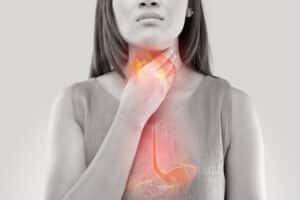
While tardive dyskinesia has been associated primarily with neuroleptic drugs, other medications can cause this condition, including some medications given for digestive troubles and nasal allergies. The longer a person is on a tardive dyskinesia inducing-drug the more likely he or she is to develop tardive dyskinesia. People over age sixty-five are more likely to develop drug-induced tardive dyskinesia than younger people are. As we age, our body’s metabolism and ability to process medication changes and slows; by age sixty these changes may already be apparent.
In February 2009, the connection between tardive dyskinesia and certain medications made the news, when the FDA announced that metoclopramide would be required to carry a “black box” label warning of the risk of tardive dyskinesia with long term use. Metoclopramide is an antiemetic prescribed for gastroparesis, severe acid reflux, and other problems; it is sold under the brand names: Reglan, Octamide, and Maxolon. Patients under sixty who use this drug for three months or more run the risk of developing tardive dyskinesia; people age sixty and older are especially vulnerable and may develop tardive dyskinesia after only a month on metoclopramide.
The following overview of drugs which can cause tardive dyskinesia is by no means exhaustive. Other medications not included here can also cause tardive dyskinesia.
Neuroleptics
Neuroleptics (anti-psychotics) are medicines given for psychiatry disorders; they have proven exceptionally effective for schizophrenia. Unfortunately these wonder drugs come with a price; they can cause tardive dyskinesia. The following classes of medicines are neuroleptics which are known to cause a tardive dyskinesia diagnosis:
Butyrophenones
• Dibenzodiazepines
• Droperidol (brand name: Isapsine)
• Haloperidol (brand name: Haldol)
• Loxapine (brand names: Daxolin, Loxitane)
Diphenylbutylpiperdines
• Primozide (brand name: Orap)
Indolones
• Molindone (brand name: Moban)
Phenothiazines
• Chlorpromazine (brand name: Thorazine)
• Fluphenazine (brand names: Permitil, Prolixin)
• Mesoridazine (brand name: Serenitil)
• Perphenazine (brand name: Trilafon)
• Thioridazine (brand name: Mellaril)
• Trifluoperazine (brand name: Stelazine)
Thioxanthenes
• Thioxanthene ((brand name: Navane)
The following drugs are called atypical neuroleptics. They are newer than the traditional neuroleptics and they are less likely to cause tardive dyskinesia; however, the atypical neuroleptics are not entirely risk- free. In some cases, people taking atypical neuroleptics have developed tardive dyskinesia.
• Amisulpride (brand name: Solian)
• Olanzapine (brand name: Zyprexa)
• Quetiapine (brand name: Seroquial)
• Resperidone (brand name: Risperdal)
Anti-cholinergics
Anti-cholinergics (anti-spasmodics) are class of medications prescribed for respiratory problems such as COPD, bladder control problems, Parkinson’s disease, and other reasons. The following anti-cholinergics have commonly been given to help control some symptoms of Parkinson’s, but these drugs can cause tardive dyskinesia:
• Benzhexol
• Biperiden (brand name: Akineton)
• Ethopropazine
• Orphenadrine (brand names: Norflex, Norgesic, Orphengesic)
• Procylindine
Antidepressants
People on the following antidepressants also run the risk of developing tardive dyskinesia, although the risk is lower than with the neuroleptics:
Monoamine oxidase inhibitors (MAOIs)
• Phenelzine (brand name: Nardil)
Selective serotonin reuptake inhibitors (SSRIs)
• Fluoxetine (brand name: Prozac)
• Sertraline (brand name: Zoloft)
Trazodone
(brand name: Desyrel)
Tricyclic antidepressants
• Amitriptyline (brand name: Elavil, Vanatrip)
• Amitriptyline combined with perphenazine (brand name: Triavil)
• Amoxapine (brand name: Asendin)
• Doxepin (brand name: Sinequan)
• Imipramine (brand name: Tofranil)
Antiemetics
The antiemetics are given to quell severe nausea and acid reflux. Metoclopramide is used primarily for gastroparesis—a condition in which the stomach does not contract properly, but this powerful drug is also used for severe cases of acid reflux and to prevent aspiration pneumonia. In addition, metoclopramide may given for headaches which are due to a disorder of the cranial blood vessels. The following drugs are antiemetics that can cause tardive dyskinesia:
• Metoclopramide (brand names: Reglan, Maxolon, Octamide)
• Prochlorperazine (brand name: Compazine)
According to the Federal Food and Drug Administration, over 2 million people now take metoclopramide (Reglan, Maxolon, Octamide); the wide-spread use of this medication means that more people are now at risk for drug-induced tardive dyskinesia.
Anxiolytics
The anxiolytics are given for anxiety disorders. The following anxiolytic has been known to cause tardive dyskinesia:
• Alprazolam (brand name: Xanax)
Antiepileptic Medications
Some drugs give to prevent or reduce epileptic seizures can also cause tardive dyskinesia:
• Carbamazepine (brand names: Atretol, Epitol, Tegretol)
• Ethosuximide (brand name: Zarontin)
• Phenobarbital (brand names: Barbita, Luminal sodium, Solfoton)
• Phenytoin (brand name: Dilantin)
Anti-Parkinson’s Agents
Parkinson’s patients are especially prone to develop tardive dyskinesia and should use caution when taking any medications known to cause tardive dyskinesia; for example, metoclopramide (Reglan, Maxolon, Octamide) should only be prescribed for people with Parkinson’s if the benefits of taking the medication outweigh the risks of developing tardive dyskinesia. Some drugs given for Parkinson’s symptoms can cause tardive dyskinesia:
• Bromocriptine (brand name: Parlodel)
• Levodopa (brand names: Dopar, L-Dopa, Larodopa)
• Levodopa (brand names: (Atamet, Sinemet)
Other Drugs which can cause Tardive Dyskinesia
The mood stabilizer lithium sometimes given for bipolar disorder can cause tardive dyskinesia:
• Lithium (brand names: Cibalith-S, Eskalith, Lithane, Lithobid, Lithotabs, Lithonate)
Dopamine (brand name: Intropin) can cause tardive dyskinesia, but this drug is generally given to people in serious condition in the hospital to strengthen the heart’s pumping action, so the benefits are considered to outweigh the risk; in addition, this medication is less likely to be given long term than some other tardive dyskinesia-inducing medications.
Even the commonly given antihistamines and antihistamines with decongestants can sometimes cause tardive dyskinesia, but this is rare; antihistamines given in combination with sympathomimetics can also cause problems.
The anti-malarial drug Chlorquine (brand name: Aralen) can cause tardive dyskinesia.
The estrogens found in oral contraceptives and hormone replacements can also cause tardive dyskinesia, but this is rare.
Ritalin and Ritalin SR, two controversial drugs given to children for ADHD also can cause tardive dyskinesia. The generic name for these two medications is methylphenidate.
In addition the amphetamine Adderall can cause tardive dyskinesia; so can caffeine in large enough doses.

